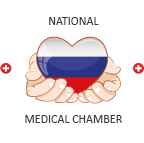The Winner Congress
The city of Smolensk hosted the 5thCongress of the National Medical Chamber. The Congress was prepared by the Medical Chamber of the Smolensk region under the auspices regional governor of Alexei Ostrovsky. The Congress discussed the results of the NMC s activities, and set out new tasks to be tackled by the NMC in the near future.
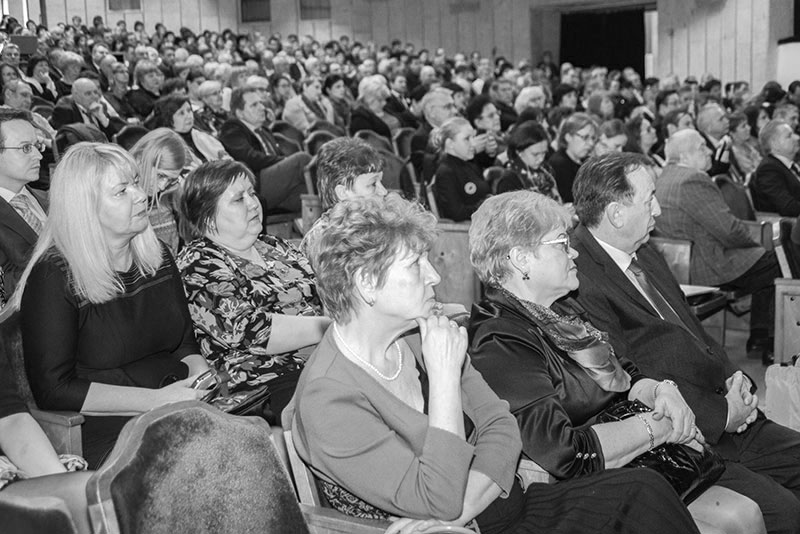
V Congress of the National Medical Chamber. Meeting
Today, the NMC is the most powerful association of healthcare professionals in Russia. And I would refer to this Congress as the Congress of Winners. HCPs from 80 Russian territorial entities and from 73 medical establishments all over the country voted for joining the NMC. It took us over 5 years to achieve this goal. Our path was not paved with rose petals; there were opposers to this powerful medical association. Tamed" associations were set up to destroy us,but they all failed. We won because we are not engaging in cheap politics; our party only comprises HCPs and patients. We do real things, and vigorously move towards uniting the entire medical community. They ve tried to instigate the All-Russia People s Front against us, which was clearly seen at the lastforum, but they failed—almost three-quarters of the Russian President's instructions were based on our proposals, — said Dr. Roshal. The NMC President marked that the resolutions of the 3dNMC Congress are controlled by the Russian President, and the resolutions of the 4th Congress are controlled by the Russian Government. But not all of them have been implemented, which means yet lots of work to do.
Leonid Roshal said that the NMC is far from politics and negative criticism, and rather prefers to work constructively in the interests of each HCP in Russia. The NMC primarily aims at ensuring that Russia is getting more of qualified HCPs, which is a pressing need of the entire population. Thanks to the agreement with the Russian Ministry of Health, any order by the Ministry related to the professional activities is first sent to the NMC for examination. Thus, this professional public organization shares the responsibility with the relevant ministry for the quality of the documents.
Together with the Russian Ministry of Health, the NMC has created a brand new state-and-public form of managing professional activities. The last year alone saw the development of 16 draft documents. In particular, the NMC efforts helped introduce changes to the high profile order No388n "On Approval of the Procedure to Render Emergency Medical Aid, Including Specialized Aid", which was severely criticized by the professional community from the very beginning. It took almost two years to work on the amendments. The amendments by the NMC were aimed at giving more powers to the Russian territorial entities, making staff schedule more functional; the amendments also related to equipping the ambulance crews, —said Alexei Boikov, Chairman of the Board of the NPO "The Association of the Heads of Emergency Services", Head Physician of the Municipal First-Aid Station of St-Petersburg, Russian Honored Doctor, M. D., Member of the Public Council under the Russian Ministry of Health. The updated procedure stipulates for the inclusion of nurses into ambulance crews, which improves efficiency of the crews, and introduces a number of other fundamental changes. The NMC significantly amended the target time for ambulance arrival. For the first time the arrival time was clearly defined—20 minutes or less after the call. The previous version only stimulated a territorial plan of emergency stations with the allowance for 20-minute transport availability. "This interval seems to be realistic,—said Alexey Boykov. We certainly understand there are regions with terrible roads for which this standard is irrelevant, while large cities face another challenge—the overloaded roads. But this is what we must work on, toughening the penalties for not letting ambulances through, and improving the infrastructure in regions. The NMC reached full consensus with the Russian Ministry of Health regarding this order.
A pilot project on IME was completed. It was initiated by the NMC in the Smolensk, Lipetsk and Moscow regions. Thus, a unique system was tested, which will help applicants elicit the truth. The NMC managed to agree prompt amendments to the Federal Law No323-FZ On the Fundamentals of Public Health Protection in Russia , which will transfer IME under the responsibility of the professional medical community.
"We have agreed with the Russian Ministry of Health that the organization and implementation of IME will fall under the responsibility of the professional organization. We must organize be the ones to organize and implement it. It is good news. We will implement this system country-wide—pre-court dispute resolution (mediation)—arbitration courts—professional IME",—said Leonid Roshal. Implementation of IME has already been initiated by the NMC in other territorial entities of Russia.
Lots of work is under way related to clinical guidelines and protocols. "We are studying their practical application to boost work efficiency. We are establishing the Research and Clinical Council under the NMC, which will be responsible for coordinating work with professional associations ",—Leonid Roshal named another direction of the NMC efforts. It was decided that clinical guidelines and protocols would first go through the interdisciplinary committee at the NMC and only then, for final approval.cv`
Moreover, the NMC is developing professional standards. The NMC has made good progress in developing conceptual documents which set out requirements to professionals of different levels. Professional standard is the basis for both admission to the profession and HCP training. The NMC and professional medical organizations started with developing four professional standards. 2015 saw lots of work done for the preparation of another ten professional standards. The current year will most likely see another 17 new professional standards coming, and clear qualification categories for each specialty."We must clearly state what graduate students and resident physicians must know and be able to do after they complete their studies, — Leonid Roshal said. Qualifying categories encourage HCPs to constantly seek professional development. He specifically stressed on the need to set up a mentorship institution to transfer legal responsibility onto mentors for the admission of every HCP to the new stage of their professional career.
Professional standards are closely related to another of the NMC s focuses — professional and public accreditation of educational programs. According to Yevgeny Shlyakhto, Vice President of the NMC, President of the Russian Society of Cardiology, Chief Cardiologist of St Petersburg and North-West Federal District, all federal state educational standards applied to the training of specialists must be brought in line with the professional standards under development."These professional standards must become the basis for educational standards, and for the system of departmental and professional public accreditation of educational programs yet to be built. As we know, the NMC has been empowered by the Council on Professional Qualifications in Healthcare under the Russian President. This is the Council that is supposed to tackle this problem. It has to monitor the appropriate healthcare segment, the need in healthcare qualifications, develop and organize the application of professional standards, and establish requirements for verifying medical qualifications and control their assessment. And, of course, to organize and carry out professional public accreditation of educational programs,"—Yevgeny Shlyakhto said.
The Council has already undertaken significant efforts. All of the MNC s regulations have been developed, which regulate professional public accreditation of educational programs. Procedures have been defined for performing accreditation itself, receipt of conclusions and issuance of accreditation certificates. The NMC comprises many professional organizations, each having its leaders and most prominent specialists. They will be the ones who will form the pool of experts to assess educational programs.
Another relevant area for the NMC s efforts will be accreditation of HCPs. Since January 1, 2016, the Russian healthcare system is gradually transitioning from current certification to accreditation. The scheme of admission to the profession is being changed. The year of 2016 will see a new procedure for admission to the profession introduced,which will affect graduates who are completing their studies according to the federal state educational standards; in the medical education system, this procedure has been implemented since 2011, said Tatiana Semionova, Director of the Department of Medical Education and Human Resources in Healthcare at the Russian Ministry of Health. The standard training duration of dentists and pharmacists in Russia is five years, meaning that the 2016 graduates of dental and pharmaceutical departments will be admitted to the professional activities through primary accreditation, which is stipulated for the graduates of 5-year programs, and in 2017 — for all other graduates. Primary accreditation is divided into three stages. The first level is tests, the second is a simulation practical exam, and the third, solution of clinical cases. The accreditation committee will perform the assessment.
Certification for already practicing certified HCPs was extended for 5 years. Their accreditation will be based on another scheme—HCPs will have to enroll into the continuing professional education system within 5 years upon the receipt of the last certificate. During these five years, the HCP will be accumulating educational activity, building up educational portfolio while also growing professional portfolio, and based on these two documents the accreditation committee will assess the possibility of this HCP to continue his/her professional career. The society of neurologists shared their positive experience with continuing professional education at the Congress.
"As we see,the accreditation committee plays a significant role in admission to profession. I am confident that these are universities that should teach our professionals, while the accreditation committee should be admitting them to profession. The accreditation committee comprises representatives of the professional community, employers and representatives of the academic community, and forms kind of triumvirate. This committee is approved by the Russian Ministry of Health. It took us long to decide who will head the committee: first we thought we would have three co-chairs, one from each pool. But later we later we decided to have one chair representing a non-profit professional public association, which is the NMC. We expect the NMC to refer their candidates for these commissions from territorial departments. In the future, we aim that the accreditation of HCPs does not relate to federal executive authorities but to the mature professional community, the NMC. And we hope that the Ministry of Health will step away from this system, and the responsibility will be fully shifted onto us,"—Tatiana Semionova said.
The Congress did not only focus on the positive side but criticized some important aspects. In particular, Leonid Roshal reminded that the NMC strongly opposed the healthcare optimization , which had been initiated locally without consulting with the medical community and which only dealt with reductions – of personnel, midwife stations, hospitals, etc. "Optimization is good but it should not be about total reduction of everything. We badly lack professionals in the industry, especially in primary care. HCPs in primary care have been burdened with many obligations, which exceeded two full time rates. We need to do something about it. We support there ferral of graduates from state-financed departments for hand-on practice for the period of 3 years"—Roshal said. We need to know the exact gap of professionals in each area, and have a clear plan of how to fill those gaps.
Partly, the reduction of HCPs was due to the President s May Decrees. To increase HCP salaries to the target levels of 2018 according to the decrees, they began to lay off HCPs to increase the salaries of the remaining staff. The NMC sees it as a profanation of the Presidential Decree.
"According to our analysis, this implementation of May Decrees badly affect the healthcare industry in the end of the day. If we fulfill the May Decrees, 90%-95% of all healthcare expenditures will be attributed to salaries and related costs. According to May Decrees, the expected salary will increase by 1% in 2014 vs. 2013, 6.3% in 2015, 22.6% in 2016 and 40.4% in 2017. If other expenses are not increased proportionally, the system will be left with scanty resources, which will severely undermine the supply of medications, consumables and medical equipment, —said Vladimir Starodubov, Director of the Central Research Institute at the Healthcare Computerization Organization at the Russian Ministry of Health, Vice-President of the NMC.
The Congress concluded that May Decrees needed to be adjusted to the new (crisis) reality. The Congress once again talked about the underinvestment of the healthcare industry: the funding must be increased up to 5% of GDP to provide HCPs with normal working conditions and improve their social status.
Other News
The Jewish Autonomous Region establishes NGO "Medical Chamber"
08.08.2016

The founding conference to be held on August 17 will establish a professional non-profit organization Medical Chamber. Local HCPs will create a professional public organization of their own.
Roshal met with the medical communities of Omsk and Novosibirsk
03.08.2016
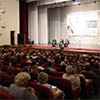
Novosibirsk and Omsk welcome Leonid Roshal, Executive Staff Member of the All-Russia People s Front (ARPF), Director of the Institute of Emergency Children's Surgery and Traumatology, President of the Non-Commercial Partnership NMC. The renowned children's surgeon discussed most pressing challenges of the Russian healthcare industry with the medical community, talked to patients about difficulties with obtaining high quality medical aid and conducted a Q&A session.
"I would nurture and cherish the existing emergency service", Leonid Roshal
27.07.2016
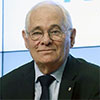
Underfunding is the major problem. I feel like the financial lobbying is against the healthcare. Healthcare is not amongst the state s main priorities, and the state keeps on cutting the funding. We had the meager 3.7% of GDP, which is now 3.4%. Moreover, our citizens tend to ignore their health. Today we face the lack of people s responsibility for their own health, which results in huge financial losses for both these people and the state. We do treat an alcoholic, who has broken his head, don t we? Why don t we them call them to responsibility?
Roshal: Novosibirsk should not haste to improve its healthcare system
19.05.2016
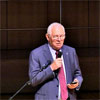
The Novosibirsk region should not be in haste to improve its healthcare system, says Leonid Roshal, President of the NMC, Director of the Research Institute of Emergency Children's Surgery and Traumatology. You should first set up professional standards for HCPs and improve their qualifications, —he said to journalists in Novosibirsk.
29.02.2016

The National Medical Chamber meets the criteria the medical professional non-profit organizations may be transferred to carry out certain functions in the field of public health protection in the Russian Federation, said President National Medical Chamber Leonid Roshal at the organization meeting of the presidium of the Council.
